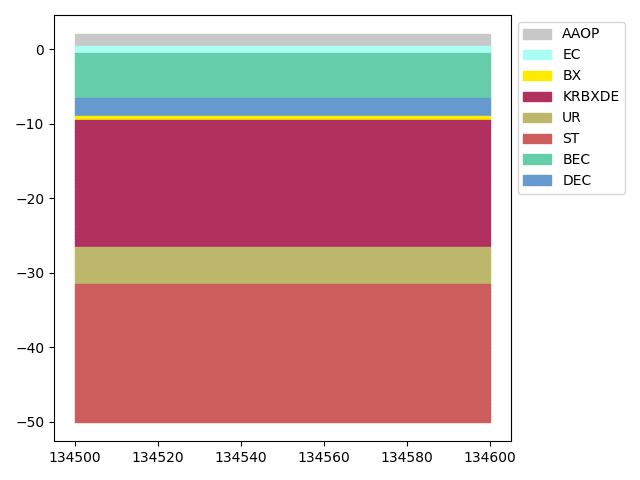Getting started
The easiest way to get started with BROmodels is in the Nuclei Notebooks.
Installation
To install this package, including the map and gef reading functionality, run:
pip install bromodels
Than you can import BROmodels as follows:
In [1]: import bromodels
or any equivalent import statement.
How to use BROmodels repo?
How to plot a GeoTop column?:
In [2]: import bromodels
In [3]: import matplotlib.pyplot as plt
In [4]: import matplotlib.patches as mpatches
In [5]: _link = {
...: "lithok": (bromodels.GeoTop.geotop_lithology_class(), "LITHO_CLASS_CD"),
...: "strat": (bromodels.GeoTop.geotop_stratigraphic_unit(), "STR_UNIT_CD"),
...: }
...:
# get data
In [6]: soildata = bromodels.GeoTopColumn()
In [7]: soildata
Out[7]:
<xarray.Dataset> Size: 6kB
Dimensions: (z: 104)
Coordinates:
x int32 4B 134500
y int32 4B 454400
* z (z) float32 416B 1.5 1.0 0.5 0.0 -0.5 ... -48.5 -49.0 -49.5 -50.0
Data variables: (12/13)
strat (z) float32 416B 1e+03 1e+03 1e+03 ... 5.07e+03 5.07e+03 5.07e+03
lithok (z) float32 416B 0.0 0.0 0.0 6.0 3.0 3.0 ... 3.0 6.0 6.0 6.0 6.0
kans_1 (z) float32 416B ...
kans_2 (z) float32 416B ...
kans_3 (z) float32 416B ...
kans_4 (z) float32 416B ...
... ...
kans_6 (z) float32 416B ...
kans_7 (z) float32 416B ...
kans_8 (z) float32 416B ...
kans_9 (z) float32 416B ...
onz_lk (z) float32 416B ...
onz_ls (z) float32 416B ...
Attributes:
title: geotop v01r6 (100.0m * 100.0m * 0.5m
references: http://www.dinoloket.nl/detaillering-van-de-bovenste-lagen...
comment: GeoTOP 1.6 (lithoklasse)
disclaimer: http://www.dinoloket.nl
terms_of_use: http://www.dinoloket.nl
institution: TNO / Geologische Dienst Nederland
Conventions: CF-1.4
source: Generated by nl.tno.dino.geo3dmodel.generator.GeoTOPVoxelM...
history: Generated on Thu Oct 05 17:01:25 CEST 2023
# set variable
In [8]: var = "strat"
# create plot
In [9]: fig, ax = plt.subplots()
In [10]: df, CD = _link[var]
In [11]: for z, nr in zip(soildata.z.values, soildata[var].values):
....: ax.fill_between(
....: [soildata.x.values, soildata.x.values + 100],
....: z + 0.5,
....: z,
....: color=df.loc[df["VOXEL_NR"] == nr][
....: ["RED_DEC", "GREEN_DEC", "BLUE_DEC"]
....: ].to_numpy()
....: / 255,
....: )
....:
In [12]: patch_list = []
In [13]: for i, row in df.loc[df["VOXEL_NR"].isin(soildata[var].values)].iterrows():
....: data_key = mpatches.Patch(
....: color=(row.RED_DEC / 255, row.GREEN_DEC / 255, row.BLUE_DEC / 255),
....: label=row[CD],
....: )
....: patch_list.append(data_key)
....:
In [14]: plt.legend(handles=patch_list, bbox_to_anchor=(1, 1), loc="upper left")
Out[14]: <matplotlib.legend.Legend at 0x7f471b804b50>
In [15]: plt.tight_layout()

More information about other user cases following soon!